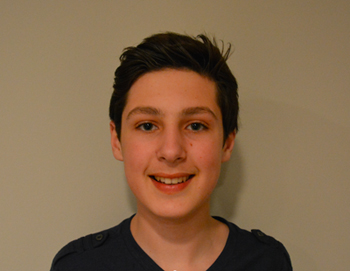
Benjamin Newman
He’s only in seventh grade, but Benjamin Newman knows that Holocaust survivors’ memories of discrimination and acts of hate are still all too relevant.
Newman, a student at Welsh Valley Middle School in Pennsylvania, attended an IWitness workshop at Main Line Reform Temple – Beth Elohim in November in which students made their own video projects incorporating testimony from USC Shoah Foundation’s Visual History Archive. Though he wanted more time to work on his video, he felt IWitness was “a creative and more engaging alternative to using a textbook.”
The inspiration for his video was modern day discrimination and acts of hate toward the Jewish people and other minorities across the world.
“In the process of creating this video, I looked through news headlines. I realized that articles in the news and the Shoah testimonies followed the same string. They both dealt with hatred towards minorities,” Newman said.
In his video, Newman combines clips of Holocaust survivors talking about how they experienced hatred during the Holocaust and footage of hate crimes and bullying today.
Even after completing the video, Newman felt so passionate about it that he entered it into two contests: the first-ever White House Student Film Festival, which invited students to submit short films about why technology is so important and how it will change the educational experience in the future; and the Jewish Federation of Greater Philadelphia’s Mordechai Anielewicz Creative Arts Contest, which encourages artistic responses to lessons of the Holocaust and related issues.
Newman wanted to bring attention to the fact that discrimination is still rampant, he said, as well as the brutal events of the Holocaust, which some people are not aware of. He was shocked to hear a friend from school say that the Holocaust was “not that big of a deal” because “there were other mass killings like it.”
“I believe it is very important that people know that this was the worst mass killing in modern history,” Newman said. “It is a big deal.”
Working with IWitness changed the way he looks at events of the Holocaust, he said. He realized that he experiences some of the issues of the Holocaust every day, such as seeing bystanders watching a kid get bullied at school; a testimony he watched described an almost identical event.
“When I finished creating my video, I felt like I knew the survivor speaking on the screen. After all, I had heard their life story in all its depth,” Newman said. “After watching the videos, the Holocaust was no longer stories of strangers facing torture in a camp, but in a strange sounding way, that stranger was my friend.”
The IWitness program at Main Line Reform Temple was made possible by Arlene and Stanley Ginsburg.